‘It’s never over.’ Atatiana Jefferson’s neighbors yearn for justice 3 years after her death
Every day, James Smith re-lives Atatiana Jefferson’s death.
The 64-year-old used to sit on his front porch swing and look out over his pristine, green lawn with a sense of peace. He chatted with his sister next door and waved at Yolanda Carr — Jefferson’s mom — and the Carr family across the street.
After Oct. 12, 2019, the front of his house became a place of torture. Each glance across the street, where the blue house at 1203 E. Allen Ave. sits empty, reminds Smith of the call he made early that morning to the Fort Worth police non-emergency line.
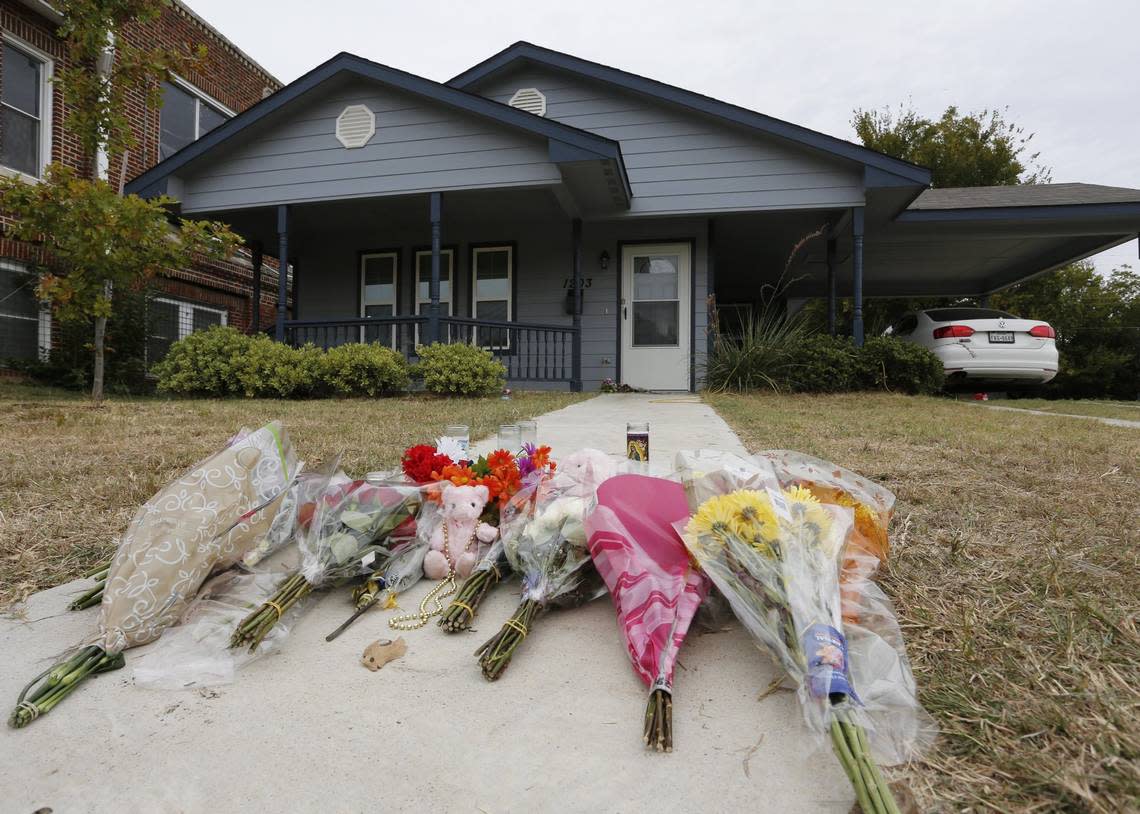
In his mind’s eye, he watches the two responding Fort Worth police officers creep into the back yard of the Carr house, where Jefferson was babysitting her 8-year-old nephew, Zion Carr. He hears Officer Aaron Dean’s shouts and the nearly simultaneous gunshot from Dean’s weapon. Every time he passes one of the 20 windows of his home, he imagines Jefferson looking into her dark back yard and seeing Dean’s flashlight just before he shot her.
These days, Smith retreats to his back yard, where he grows tomatoes, yellow squash and other vegetables. There, he is at least not faced with the house where Jefferson was killed, which is now decorated with banners displaying her name in big letters. Smith has a banner in his yard, too, adorned with a picture of Jefferson’s face and the words, “We Want Justice!!” in silver cursive.
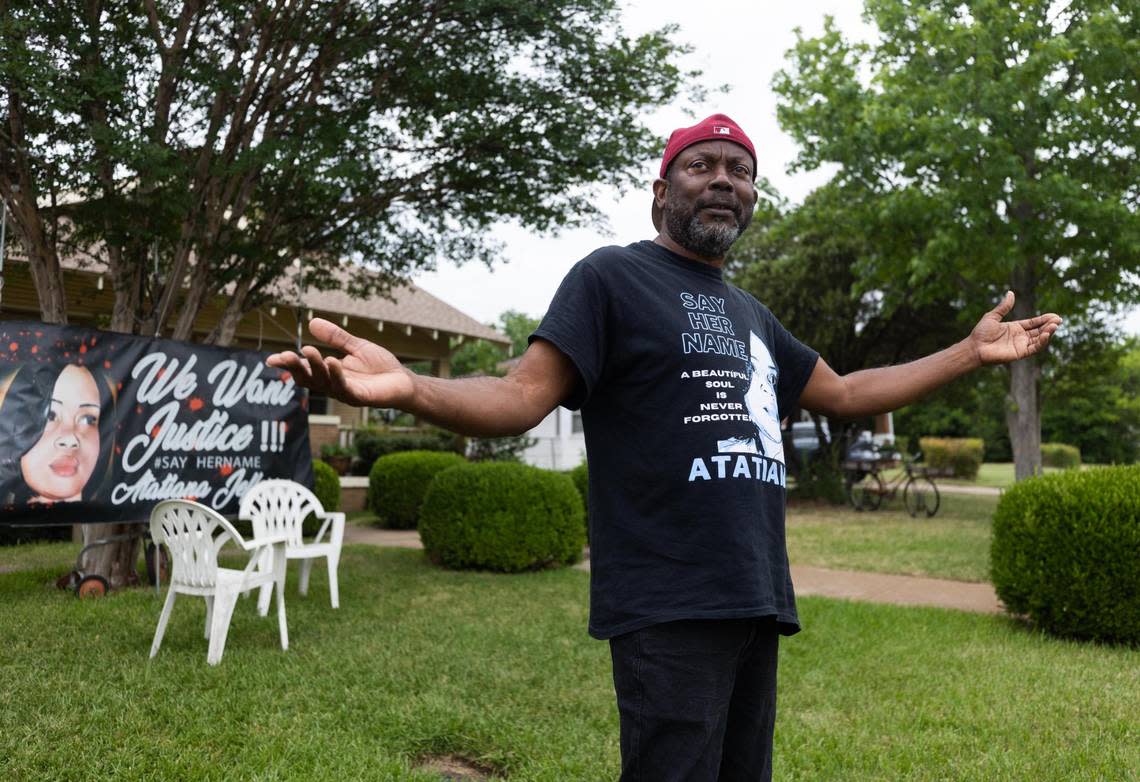
Smith, like most Black East Allen residents, has lived in his home for decades. On the south Fort Worth street, many residents inherited their homes from parents or, in Smith’s case, great-grandparents.
One resident of East Allen, Leslie “Geronimo” Beasley, described the street where he’s lived for 51 years as a community where everyone not only knows each other — they all know each other’s families.
“Every Black person you see here,” Beasley said. “... they been here my whole life, like me.”
When Dean shot Jefferson at 1203 East Allen, repercussions rained on Fort Worth. The aftermath fell hardest on Jefferson’s family, Smith and those on the street where Jefferson was killed.
As the third anniversary of the shooting approaches and the long-awaited murder trial for Dean is finally set to begin in Fort Worth on Dec. 5, the breath many have been holding might finally be released. But for Smith — and others directly touched by Jefferson’s death — a trial is not the end.
“It’s never over,” Smith said.
East Allen Avenue
The two-mile stretch of East Allen where Smith, Beasley and about 100 other families live is bordered to the west by South Interstate 35W and to the east by South Riverside Drive. Halfway down East Allen, the street splits into a north and south section.
The Star-Telegram talked to residents on East Allen in May, a month before the Jefferson trial was last scheduled to begin on June 23. But a week before the trial was to start, Dean’s attorneys filed a motion for Judge David Hagerman to be removed from the criminal case. Hagerman’s subsequent removal as the trial judge delayed the long-awaited case even further — as of now, the trial is set to begin in December in Judge George Gallagher’s court.
On a breezy Monday afternoon in May, a handful of cars meandered down the southern portion of East Allen. Kids played in the street on bicycles. A group of women watched them and laughed amongst themselves as they leaned against a red pickup truck. Neighborhood kids piled into the truck bed.
Jeanette Powell, Sandra Quintana and Valerie Valdez leaned on the red truck in front of Powell’s tan house that Monday afternoon. Powell has lived in the house — where a private property sign hangs above the sizable porch — since 1975.
The neighborhood is “nice and quiet,” the 72-year-old said. “Everybody’s a family.”
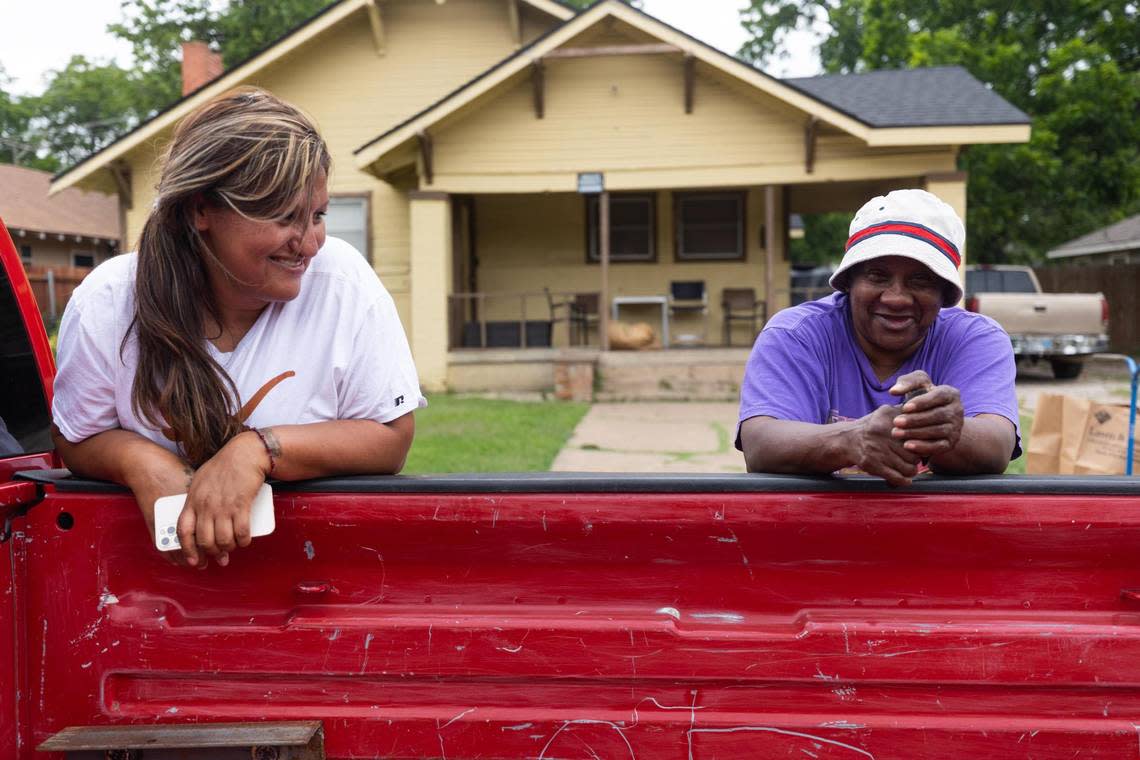
Valdez, 30, moved across the street eight months ago. She said they sometimes hear gunshots or other noises “over there” — she gestured to the east of East Allen — but “here we keep to ourselves.”
The neighbors said they don’t talk much about what happened to Jefferson. Valdez, the newest of the three residents, hadn’t heard about it. Across the street, just a few doors down from Smith’s home, another woman said she had not heard about Jefferson, either.
Quintana, 40, has lived next door to Powell for seven years. She likes that the whole block knows one another and many “were born here.” Quintana said she remembers the shock and horror she felt when she first heard about Jefferson’s death. A former neighbor was passing by and heard a gunshot before telling Quintana about it.
Quintana said before Dean shot Jefferson, she didn’t think twice about leaving her then 15-year-old daughter home alone. That changed after the shooting.
“Even though she’s about to be 18 almost in November,” Quintana said, “It’s still no.”
Quintana has since talked to her daughter about how to act if she’s ever confronted by police. She encourages her to comply and own up to any mistakes.
“It’s a learning lesson, too — to how to react when things happen, but it is sad ... that she was a young girl and a good girl,” Quintana said about Jefferson, who was 28.
A few houses down from the women, Beasley sat in a white car outside his sister’s house. He grew up in the house and still goes inside if he needs a shower or a meal, but he mostly lives out of his car. He described himself as a “street person” and showed off his various scars — a bullet wound near his left armpit, and a T-shaped scar from a knife wound on his arm he calls his “Allen street tattoo.”
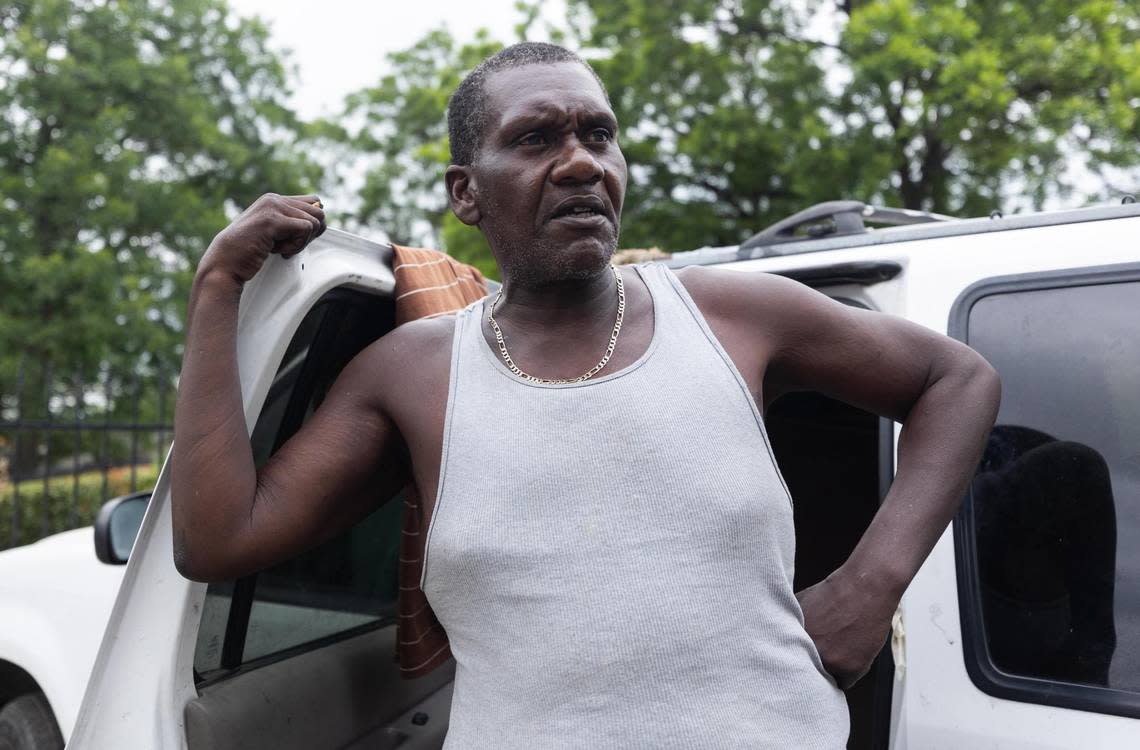
“But I love everything and everybody. Like this little kitty,” he said, gesturing to the black-and-white kitten beneath his car who lapped at a bowl of milk Beasley put out. “He won’t let me touch him. He might holler all night and eat my food. But it’s all good, you know.”
Beasley said he is proud of where he lives. When his bike tires go flat, a neighbor helps him fix them. Another neighbor built his sister’s black, wrought-iron fence for free. The street has changed over the decades, he said, with more Hispanic families moving in, but now “it’s even better.”
‘It wasn’t anything new at all’
With some residents on East Allen, a conversation about Jefferson quickly becomes a discussion about how police have treated Black people in the area for decades.
Multiple people, including Powell and Beasley, mentioned the fact that police did not announce themselves while responding to the call and parked around the corner from the house that night.
Dean and another officer responded to the house after Smith called the non-emergency line at 2:33 a.m. because the front door to the Carr family’s house was open, and he said that was unusual for the late hour. The call was dispatched as an open structure call, and Dean and the other officer — rather than approach the front door of the house — opened a gate and let themselves into the back yard.
Jefferson heard something in the back yard, her nephew later told police, and she went to the back window with a handgun to check if there was a prowler. Body-camera footage of the shooting shows Dean and the other officer use flashlights to check the perimeter of the house and inspect two doors that are open with closed screen doors. At the back of the house, Dean appears to see Jefferson through a dark window, and he quickly twists his body to the left.
“Put your hands up! Show me your hands!” he shouts through the window, his gun drawn. About one second later, he fires a single shot through the window, killing Jefferson.
Powell said like Jefferson, she also would’ve quickly reacted if the officer came to her house that night.
“If the police had come to my back yard, unannounced, he probably would have been shot,” Powell said about Dean. “I would have shot him.”
Freddie Mae Jackson is one of the oldest residents of the street. The 88-year-old’s garden is filled with knee-high sculptures, white rocks and a metal table, where she sat one afternoon in May with a yellow flyswatter. She’s watched her neighborhood change over the years, but said she enjoys spending time with her new neighbors.
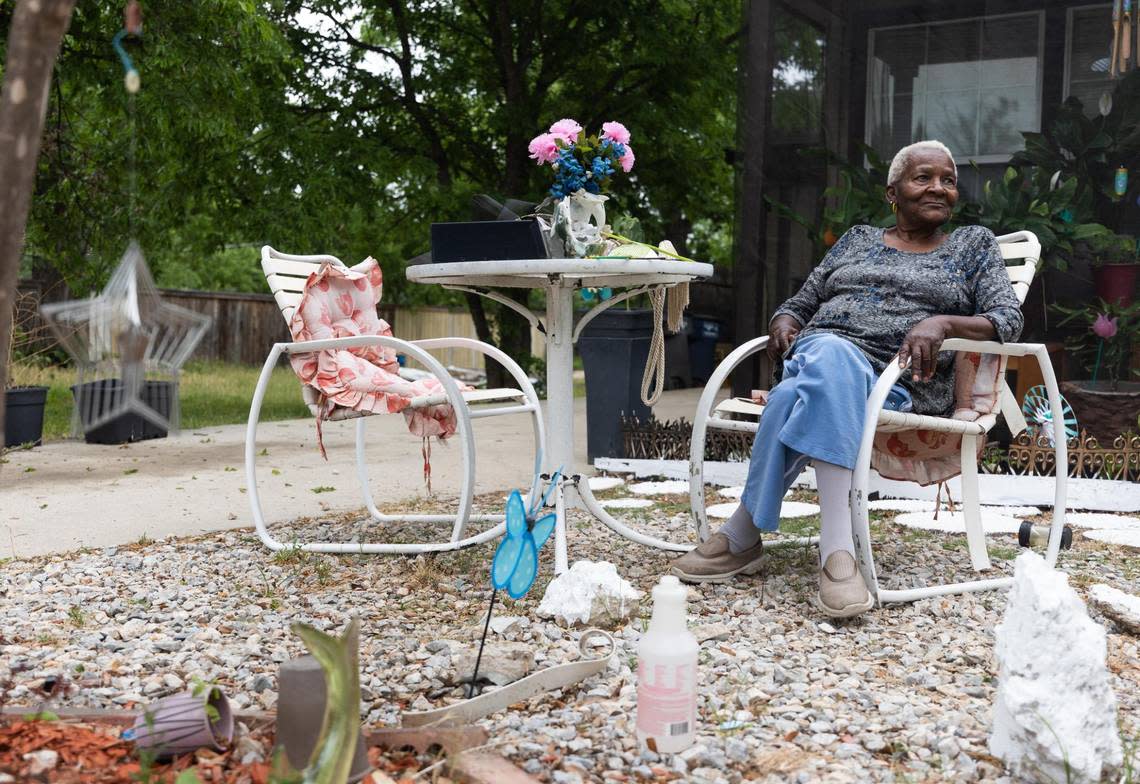
She pointed to the houses around her and described several as “very friendly.” To one house across the street she said, “That’s my backbone over there.”
If “they come by 90 times,” Jackson said. “They’re gonna speak [to me] 90 times.”
She said Jefferson’s death at the hands of police was no surprise.
“It wasn’t anything new. It wasn’t anything new at all,” Jackson said.
Jackson was born on Crawford Street near Rosedale. She grew up moving to many of Fort Worth’s historically Black communities like Como and Mosier Valley, but she settled on East Allen in 1957 at a multi-unit build. She and her family could not use the front door because they were Black; they went in the back instead.
“That discrepancy has always been,” she said. “Sometimes you think it’s getting better, but it’s just a little sugar added to it. That’s all it is. Just a little more sugar.”
Her grandkids are spread out across Dallas-Fort Worth now, inviting her to visit Crowley, Everman and other suburbs. She won’t go. When she was younger, those were places she could only go “if I was cleaning someone’s house.”
“I’ve been here 88 years and a little bit has changed,” she said. “But not much.”
‘How long do we have to wait?’
Since the shooting, Smith and the rest of the neighborhood have been waiting on a trial.
When asked about the Dean trial, Powell laughed.
“Are they gonna have one?” she said to the Star-Telegram in May.
Two weeks later, the trial was postponed.
The murder trial has been delayed multiple times. As of now, jury selection is set to begin on Nov. 28 — 1,143 days after Jefferson was shot.
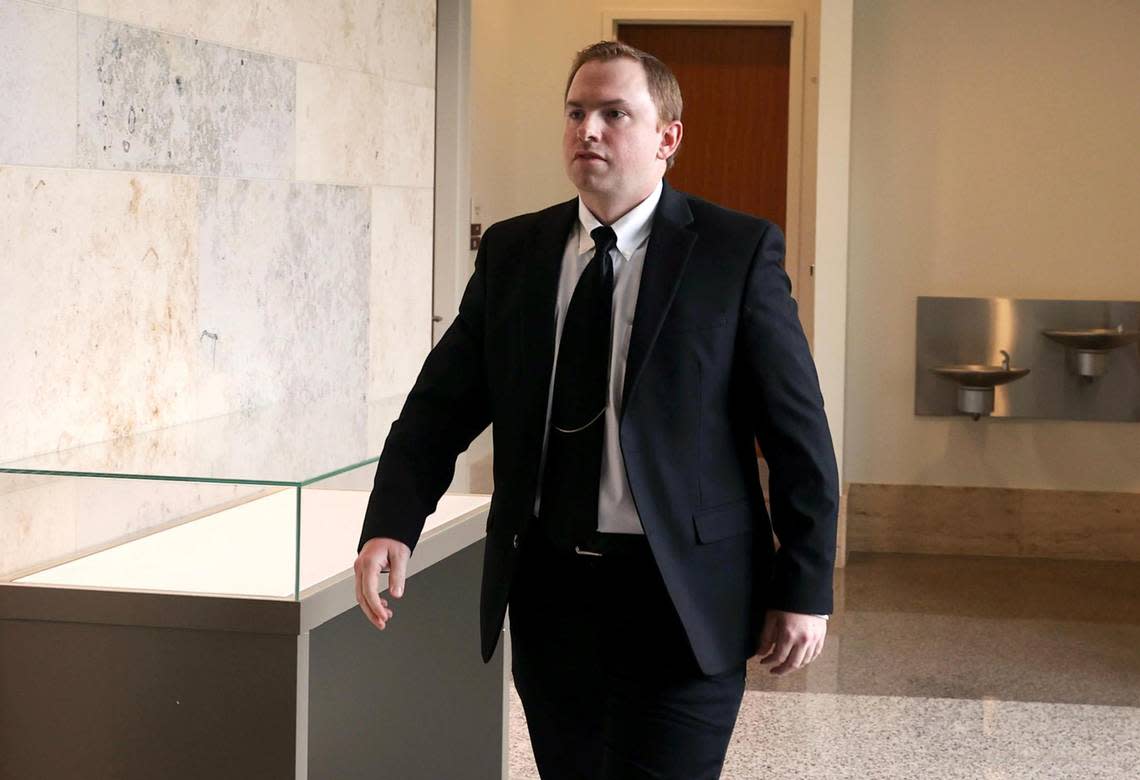
In December 2021, when Hagerman approved the first motion from Dean’s attorneys to delay the murder trial, Jefferson’s sister posted about her frustration on Facebook. The family had already waited more than two years for a trial date due to the court’s COVID-19 backlog.
“Is this how justice comes for black women?!!” Ashley Carr posted. “Just let me know!! How long do we have to wait?”
In October 2020, Ashley Carr told the Star-Telegram during an interview that the family was “at a standstill.”
“Everyone is moving around me, and I’m stuck,” Carr said. “I can’t move. I can’t move forward.”
The Carr family declined recent interview requests due to a gag order placed on the case.
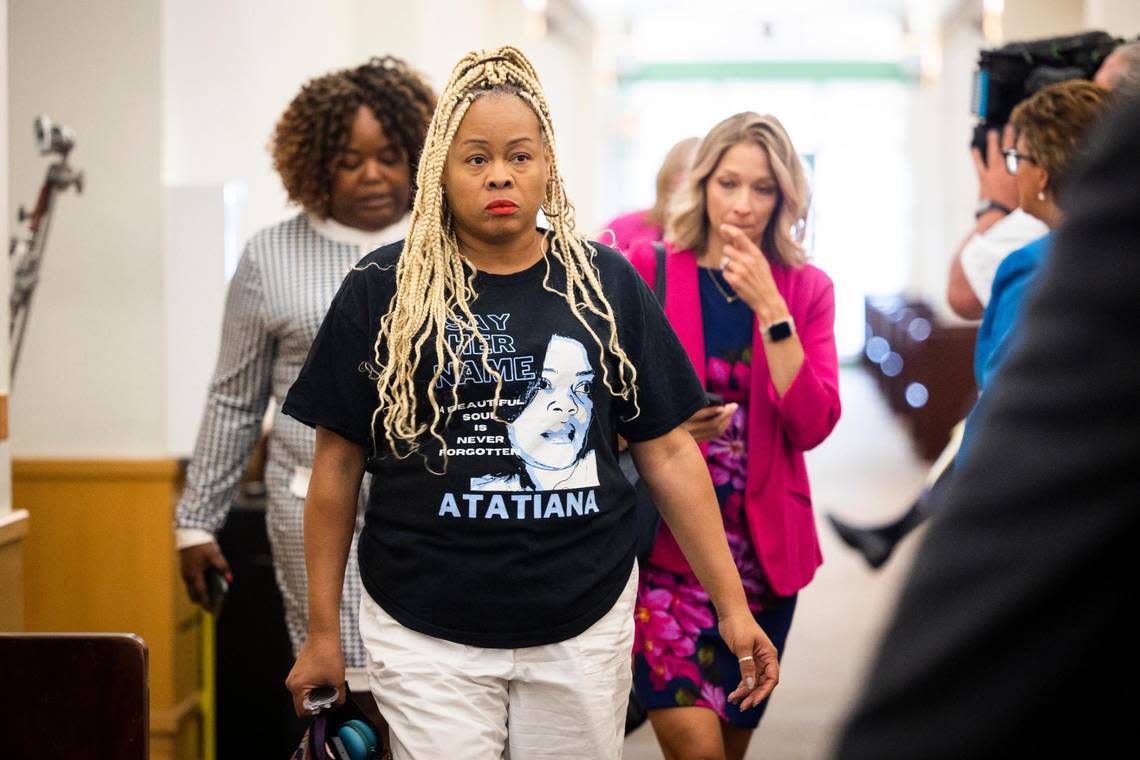
Smith hopes Dean, who is white, being indicted at all indicates police are being increasingly held accountable for shooting Black people. But he said police reform still has a long way to go. He mentioned a Fort Worth police officer who recently shoved a man to the ground while he was handcuffed. The officer was fired, according to a press release from the police department on May 20, after another officer reported the excessive force.
“There’s nothing wrong with accountability, and there’s nothing wrong with police reform,” Smith said. “What could be wrong with getting your bad cops off the force?”
Sometimes in his wait for accountability, Smith said he feels like one of the hummingbirds in his garden, beating its wings furiously but hovering in the same spot.
After the trial, Smith said, he won’t find peace, but he might be able to metaphorically land.
“Me and the family, all we want to do is land,” he said. “Either way.”
Remembering Atatiana
At a hearing in May, Smith stood outside the Tarrant County courthouse for three days, from 9 a.m. to 5 p.m., with his homemade banner featuring Jefferson’s face.
Some drivers yelled her name as they passed, or raised a fist in solidarity. Others asked Smith who the woman on the banner was.
After the shooting, protesters across the city chanted Jefferson’s name and demanded accountability. In 2020, after the murder of George Floyd, Jefferson’s name was once again shouted in the streets of downtown Fort Worth during local protests. But Smith worries as the years pass, Jefferson’s name and her story will fade from the city’s collective memory.
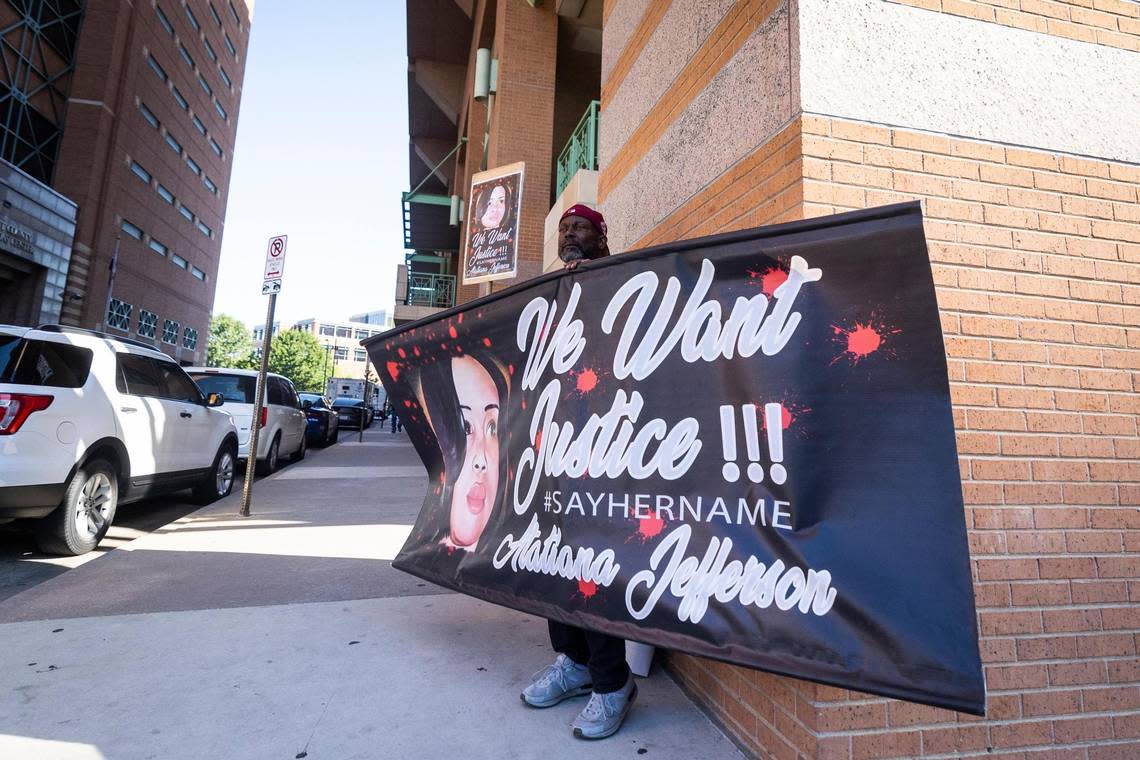
Smith was with Jefferson’s mother, Yolanda Carr, when she died in January 2020.
“Atatiana’s mother is not here to fight for her daughter,” Smith said. “If she was alive, she would make sure she was not forgotten.”
After Jefferson’s death, Smith pushed the city council to memorialize Jefferson. In December 2020, the city unveiled the Atatiana Jefferson Memorial Parkway on a stretch of Allen Avenue and Maddox Avenue from Interstate 35W to U.S. 287. For Smith, it’s not nearly enough. He wants people not just to know her name, but also to know her story.
“I’m not content with that, because signs get older. They get distorted, they get lost,” he said. “I wanted something more permanent.”
To make sure young people remember Jefferson, Smith is working to have the Hillside Community Center renamed after her, with a plaque out front that tells her story. He also wants a section of I-35 to be renamed, not just memorialized, for Jefferson.
Jefferson’s family started The Atatiana Project, which seeks to “inspire, educate, and grow generations from under-resourced communities by providing access to high-quality education in the fields of STEM.” Jefferson attended Xavier University in Louisiana to major in biology, and she planned on becoming a doctor.
The family also hopes to turn the Carr house on East Allen into a place of refuge for young people in the neighborhood.
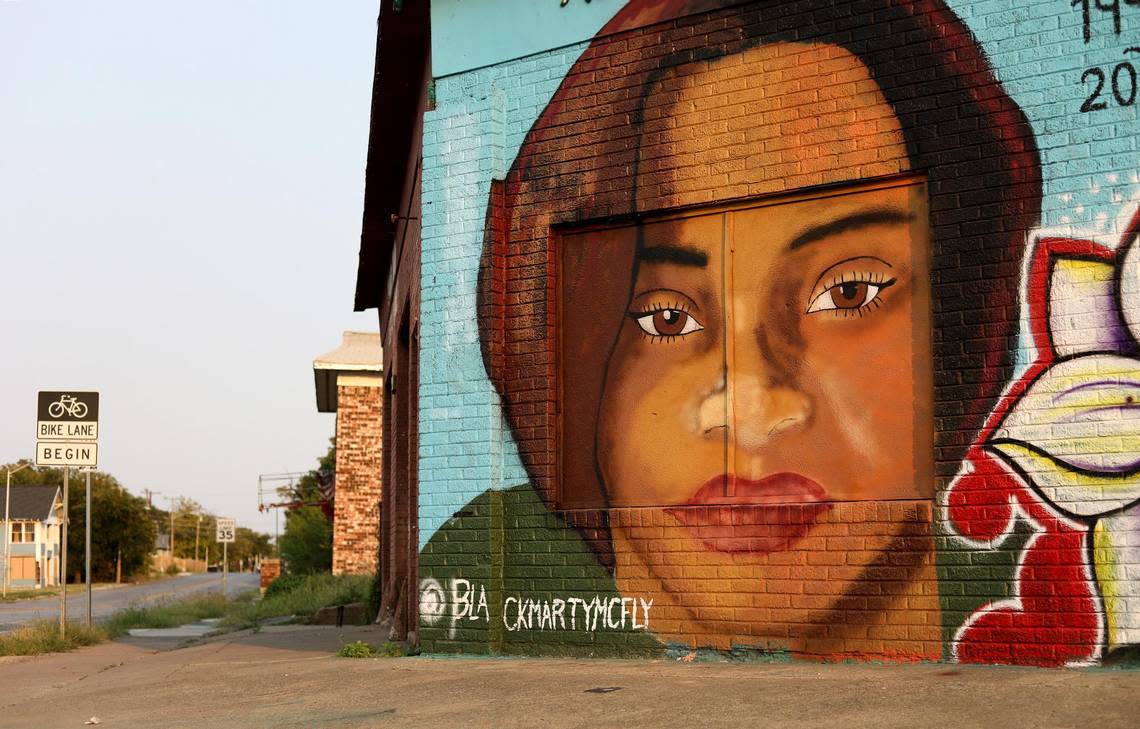
No matter what happens at the trial, Smith says the remainder of his life will likely be dedicated to making sure Jefferson is remembered, even after he’s gone. He worries he won’t have enough time.
His health has declined because of the stress and guilt of Jefferson’s death. He’s lost weight and spent four days in the hospital after a stroke.
Still, there is some hope that at some point, Smith can return to his once-favorite spot looking out across his neighborhood.
“I want to sit on my porch swing and watch the cars go by,” he said, “like I have for 60 years.”
